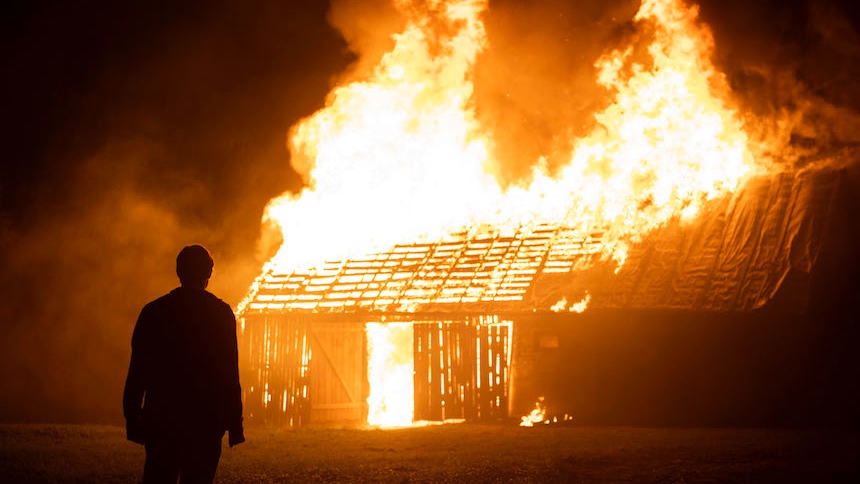Chattanooga 2023 Review: WE MIGHT HURT EACH OTHER, Graduation Party Gone Wrong Or Social Responsibility Lesson?
Jonas Trukanas directed the thoughtful horror thriller from Lithuania.

The new Lithuanian horror film originally titled Rūpintojėlis (literally: Caregiver) has been retitled We Might Hurt Each Other (changed from an earlier title of Pensive) for its English-language release. As with many films, it's unclear exactly why the movie's title is being changed, particularly given the multilayered meaning of the original title in relation to the content of the film.
The movie begins as a story about Lithuanian teens looking for a place to celebrate their recent graduation after their planned party rental location falls through. In that chaos, the not exactly popular or unpopular Marius (Šarūnas Rapolas Meliešius), desperate to win the affection of Brigita (Gabija Bargailaitė), manages to overhear his realtor mother discussing an empty cabin she's struggling to sell. It's the perfect remote location for a bunch of teens to party without adult supervision, and to make matters better, he knows where the key is hidden.
When the teens arrive, they discover strange, life-sized, wood-carved statues around the property. One student says the statues are the work of a man inspired by the grief of losing his family in a tragic fire, believed to have died by suicide sometime after creating the statues. To make things even spookier, once the teens enter the cabin and see its ash-black walls, there's no doubt that this is the home where the tragedy occurred.
It takes some time, but inevitably the youths begin to vandalize the statues and use them for firewood, and shortly thereafter, the violence begins. I won't spoil the threat the recent graduates face, but suffice to say that the violence is explicitly enacted on behalf of the statues, as if enacted by a caregiver. The original title's aptness goes further, though, as Marius struggles with his responsibilities to himself, Brigita, and the rest of their classmates, including his best friend Vytas (Povilas Jatkevičius).
That theme of social responsibility doesn't track perfectly with every narrative beat in the film, but moral questions arise throughout the film. Most obvious among them: how responsible we are for problems we did not create?
Marius did not participate in the vandalism of the statues, and in fact attempted to stop his peers from destroying the works of art. Yet, does that absolve him of any responsibility for helping the people around him who did create the problem? It's clear enough what the film thinks, especially by the end, but the question is more important than the answer.
What's most remarkable about the film, though, is that it avoids any heavy-handed allegorical handholding and instead builds an emotional core before introducing its horror, and thereby its themes. It feels as though the first half of the film is dedicated to introducing the audience to some of the teens, allowing us to get to know them and like them, or most of them at least.
The recent graduates are depicted as real and complex people, despite their archetypes. Some popular kids are arrogant and rude, others are perhaps too dedicated to partying hard, and of course, as requisite teen movie characters, there's the couple who are eager to have sex for the first time. Among these students, Vytas and Saulė (Saulė Rašimaitė), the quiet girl that he begins to spend time with at the party, are highlighted as especially sweet, kind, and charming young people.
Developing these characters before the genre fun kicks in lets the film's ideas seep into its story without overstating those ideas to ensure the audience understands, as has become all too common in recent horror. Albeit some viewers may not pick up on these ideas given that they are not highlighted, underlined, and shouted, but there's enough in the film to make it an enjoyable horror film even if you don't suss out, or care about, its message.
It's impossible not to care for these teens and the emotional beats land, whether there's a larger idea attached to them or not. The kills are bloody and often more comical than horrifying. First time feature director (and co-writer) Jonas Trukanas shows a talent for creating excitement with camera movement through a space.
More than anything else: the film looks amazing. The crisp cinematography shows off the natural beauty of the surrounding forest, cliffs, and lakes during the day when the students first arrive, and allows for some striking nighttime images of partygoers lit by fire and flashing strobe lights.
We Might Hurt Each Other/Rūpintojėlis isn't groundbreaking, but its commitment to character and ability to engage with socially meaningful ideas without becoming more PSA than horror film make it worth seeking out for horror fans.
The film enjoyed its North American premiere at the Chattanooga Film Festival.







